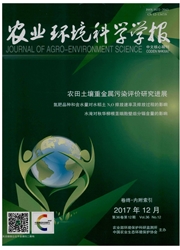

 中文摘要:
中文摘要:
为探究外源抗坏血酸(As A)提高自毒作用下番茄抗逆能力的内在机制,以优良番茄品种"粉冠一号"为材料,用连作3 a番茄的基质浸提液处理种子及幼苗,研究了不同浓度(0、0.25、0.5、1 mmol·L-1)As A对自毒作用下番茄种子发芽率、发芽势、发芽指数和幼苗主根、上胚轴长、抗氧化酶(SOD、POD、APX)活性、抗氧化剂(As A、GSH)含量、MDA含量和电解质渗漏率及根系超微结构的影响。结果表明:单一基质浸提液处理可抑制番茄种子的萌发和幼苗生长,降低SOD、POD和APX酶活性及GSH和As A含量,MDA含量和电解质渗漏率升高;当用含有不同浓度As A的基质浸提液处理后,与单一基质浸提液处理相比,番茄种子的发芽率、发芽势和发芽指数均增大,幼苗主根和上胚轴的生长加快,植株的抗氧化酶活性和抗氧化剂含量升高,MDA含量和电解质渗漏率均降低,对幼苗根系结构的不良影响减少。外源As A能维持番茄幼苗正常的生理功能,有效缓解连茬基质浸提液对其造成的自毒胁迫。所有处理各指标的综合隶属函数值分析表明,1 mmol·L-1的As A缓解效果最好,0.5 mmol·L-1次之。
 英文摘要:
英文摘要:
Ascorbic acid widely present in many plant tissues is a high abundant and small molecular antioxidant. It plays an important role in protecting plant cells from oxidative damages and stimulating cell division and elongation. This experiment was carried out to explore the effects of exogenous ascorbic acid on resistance of tomato to autotoxicity. Tomato seeds were treated with substrate extracts of 3 year continu-ous tomato cropped soil, and the effects of exogenous ascorbic acid at different concentrations(0, 0.25, 0.5, 1 mmol·L-1)on the seed germi-nation and plant growth of tomato and the ultrastructure of roots were then investigated. It was found that substrate extracts suppressed seed germination, seedling growth, decreased the activities of superoxide dismutase, peroxidase, and ascorbate peroxidase, and reduced the con-tent of glutathione and ascorbic acid, but increased malondialdehyde content and relative electrolyte leakage. Compared with substrate ex-tracts, treatments with ascorbic acid at 0.25, 0.5 mmol·L-1 and 1 mmol·L-1 increased the seed germination rate, germination energy and ger-mination index, enhanced seedling root and epicotyl, elevated the protective enzyme activity and antioxidant content, decreased malondi-aldehyde content and relative conductivity. In addition, exogenous ascorbic acid could alleviate harmful effects on root structure. There re-sults indicate that supplying exogenous ascorbic acid could alleviate tomato autotoxicity caused by continuous cropping, with 1 mmol·L-1 having the best effect.
 同期刊论文项目
同期刊论文项目
 同项目期刊论文
同项目期刊论文
 期刊信息
期刊信息
